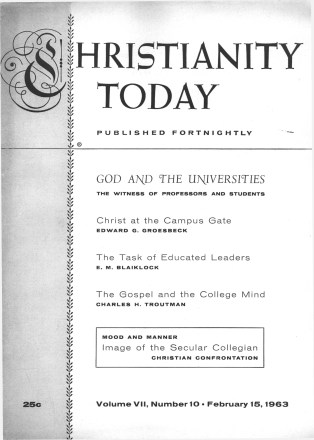An event of considerable interest in the religious world is the publication of the first of two volumes containing the Registers of the Company of Pastors of Geneva which cover the period of Calvin’s residence in that city. This present volume, in fact, puts in its appearance out of chronological order, for it covers the final years of Calvin’s life, from 1553 to 1564. Next to appear will be the volume covering the earlier years, and the editors (Dr. R. M. Kingdon and Messieurs J.-F. Bergier and Alain Dufour) not only promise a third volume comprising a general introduction, but also express the hope that they may be able to extend the enterprise in yet further volumes which will relate to the years from Calvin’s death to the end of the sixteenth century—years which are less well known but of great significance in the development of the Reformation in Europe. The work is being published, under the supervision of the Rev. J. Marcellus Kik as managing editor, by Librairie E. Droz of Geneva—a publishing house already having to its name a distinguished sequence of works on personages and movements of the fifteenth and sixteenth centuries. The text of these contemporary records is partly in French and partly in Latin, and the writer of this review is preparing an English translation for publication next year.
1553 was the year of the arrest, trial, and condemnation of Michael Servetus, the notorious assailant of the Christian doctrine of the Trinity. As early as 1531, when only 20 years old, he had published his Seven Books concerning the Errors of the Trinity. Subsequently he had studied medicine and practiced as a physician. His work The Restitution of Christianity appeared in 1553, and this same year he was recognized and apprehended in Geneva. The Registers give the written theological disputation that took place between Servetus and the Genevan ministers (the agent of the latter being in effect Calvin). The views of Servetus were tortuous and bizarre, and he was not too scrupulous in his manner of quoting from the patristic authors when claiming support for his aberrations. Despite earnest attempts to persuade him to an orthodox frame of mind, he remained brazen, obdurate, and unrepentant, and on October 27, 1553, he was burnt at the stake by order of the city council of Geneva, with the approval of the churches of Berne, Basle, Zürich, and Schaffhausen as well as the church of Geneva.
Today, quite rightly, we deplore this burning. Enemies of Protestantism have constantly used it as a stick with which to beat the church of the Reformation. But it should be remembered, firstly, that this one incident was a drop in the ocean compared with the cruel tortures and deaths inflicted on a multitude of Protestants, and, secondly, that Servetus would have been burnt by the Roman Catholics with no less alacrity had he been apprehended in one of their states instead of in Protestant Geneva. Servetus was universally condemned as an intolerable heretic, and in those days the penalty for heresy was death. In time the Church learned once again that though heresies may never be tolerated, the heretics who propound them should be disciplined by excommunication but not killed. Today the Church seems all too prone to go to the other extreme by tolerating not only heretics but also their heresies, so that the orthodoxy of the past is looked on by many as the oddity of the present, and sometimes not tolerated.
The perusal of these Registers shows that the tasks and problems of the Church were basically the same then as they are now. We observe the occurrence of a dispute between the ecclesiastical and the civic authorities over the right to excommunicate offensive members. When the state sought to deprive the Church of this right, the ministers declared that “they would choose death rather than consent to the abandonment of so holy and sacred an order, which had for so long been observed in the church.” We find theological tension and rivalry developing between Geneva and the neighboring territory of Berne. We read of a visit of the famous William Farel to Geneva when he stirred up trouble for himself by preaching against the misdemeanors of the youth of the day. His integrity was vindicated, however, and the city treated with honor this man to whom so many of its citizens owed their conversion.
Quaint characters also appear on the scene. In September, 1554, an unnamed Scotsman presented himself before the Company of Pastors, claiming that God had called him to go to all the churches and bring about the settlement of all disputes. He sought to authenticate his claim, we are told, by adducing some quite inappropriate passages of Scripture. The pastors responded that though they were unable to recognize his vocation or to give him letters of commendation, yet they would glorify God if he were used for the benefit of the Church.
We are able to witness, as it were, the care with which appointments to the sacred ministry were made: the choice of men of unblemished character; the emphasis on preaching and pastoral responsibility; the concern for the reverent use of the sacraments and for the proper exercise of discipline. Systematic Christian education was a prominent part of the program of reform, and humanitarian provision was made for the sick, the aged, and orphans.
But while duly concerned with the building up of a strong and healthy Christian society in Geneva, the church there was by no means preoccupied with its own needs. Nothing testifies more eloquently to the spiritual vitality of Calvin’s church than the quite remarkable missionary activity revealed in an almost incidental manner in these records. Over and over again we come across the minutes of men being sent to minister not only to the country villages of the Genevan territory, but to towns and cities throughout France and to the islands off the coast of France, also down to Piedmont in Italy, and even across the seas to far-off Brazil. So much for the calumny, still current, that Calvin’s theology spells the death of evangelism!










